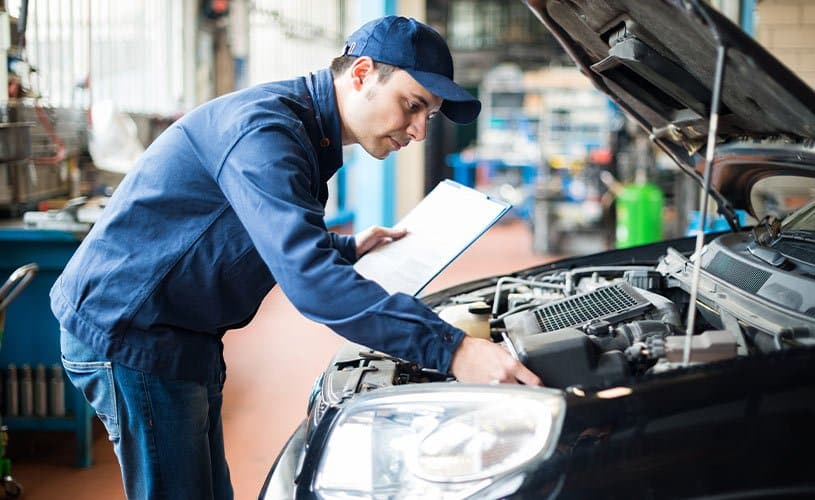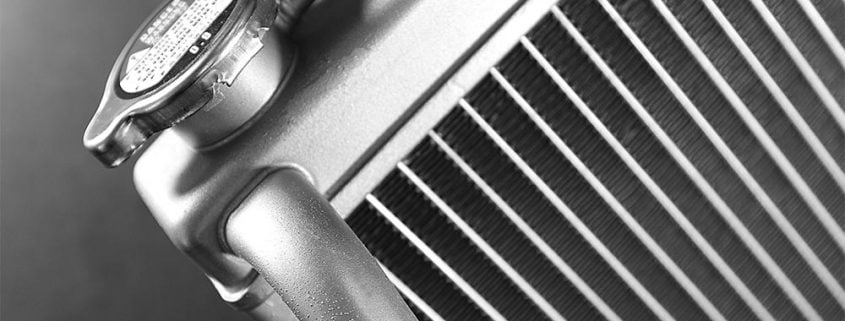How long does a car radiator last?
A well-maintained car radiator should last 8 to 10 years, but corrosion, coolant leaks, or clogged fins can shorten its lifespan. Regular servicing extends radiator life and prevents engine overheating.
Your car’s radiator plays a critical role in maintaining optimal engine temperature. Replacing or servicing a radiator at the right time can prevent costly engine damage. This guide covers the average lifespan of a radiator, common problems, and how to keep your radiator running longer.
What is the average lifespan of a car radiator?
Most car radiators last 8 to 10 years, but the lifespan of your radiator depends on your driving habits, mileage, and how well your cooling system is maintained. Radiators typically last longer when coolant flow is consistent, debris is flushed out, and corrosion is prevented.
If your car is low-mileage and serviced regularly, the radiator may last closer to the life of the car. However, vehicles exposed to harsh conditions, such as off-road driving or salty coastal air, may need a radiator replacement sooner.
Learn more about car radiator servicing at Natrad.

What factors can make a radiator fail sooner?
A radiator may fail before the 8 to 10 year mark if other cooling system parts stop working correctly. Common radiator problems include:
- Coolant leaks from cracked hoses, fittings, or radiator tanks
- Corrosion on radiator fins or inside tubes
- Clogged radiator tubes restricting coolant flow
- Rusty or damaged fins reduce cooling efficiency
When coolant levels are low or leaks occur, the radiator can no longer effectively remove heat from the coolant, causing the car’s engine to overheat.
For safety, remember never to open a radiator cap on a hot engine. Pressurised coolant can erupt and cause severe burns.
How can radiator maintenance help it last longer?
Radiator maintenance is vital for extending the life of your car radiator. Key maintenance steps include:
- Coolant flushes every 24 months to remove debris and old antifreeze
- Hose inspections for swelling, cracks, or leaks
- Checking coolant levels at the same time as engine oil
- Servicing the thermostat and cap to maintain pressure and flow
A well-maintained radiator can last longer than 10 years, while neglecting regular service may shorten its lifespan. Following a proper maintenance schedule keeps your cooling system running efficiently.
Book a radiator service at your nearest Natrad store.
Do different radiator types last longer?
Not all radiators last the same amount of time. Plastic-aluminium radiators are common in modern cars but tend to have a shorter lifespan because plastic tanks expand and contract with heat cycles until cracks form.
By comparison, copper-brass radiators are easier to repair and last longer when properly maintained, but they are heavier. Full alloy radiators offer excellent strength, heat dissipation, and resistance to vibration, making them a durable, long-term option.
Your choice of radiator depends on vehicle type, driving conditions, and cooling performance requirements.
| Radiator Type | Average Lifespan | Pros | Cons | Best For |
|---|---|---|---|---|
| Plastic-aluminium | 6–10 years | Lightweight, affordable, and common in modern cars | Plastic tanks expand/contract and crack over time | Every day cars needing standard cooling |
| Copper-brass | 8–12 years | Strong heat conductivity, easier to repair | Heavier, can balloon under high pressure | Classic cars, moderate use in cooler areas |
| Full alloy (aluminium) | 10+ years | Strong, durable, resists vibration & corrosion | More expensive, not always needed for daily driving | High-performance cars, towing, off-road |
What are the signs that your radiator needs replacing?
Signs that your radiator may need replacing include:
- Low coolant levels or frequent top-ups
- A temperature gauge that runs hot
- Steam or visible coolant leaks under the car
- Rusty or corroded fins on the radiator
- Overheating during regular driving
If your car’s radiator shows any of these symptoms, it may need to be replaced to avoid long-term engine damage. Learn more in our guide about common radiator failures.
How can you extend the life of a radiator?
You can keep your radiator in good condition by:
- Checking coolant levels regularly to spot leaks early
- Flushing the cooling system every 24 months or per the manufacturer’s schedule
- Replacing hoses and clamps when they show wear
- Book regular inspections to catch issues before they cause overheating
Taking these steps helps extend the life of your radiator and prevents damage to the engine’s cooling system.

How do I get a new radiator?
If your radiator is older than 8 to 10 years or shows signs of failure, you may need a radiator replacement. Natrad technicians can recommend the right new radiator for your car, whether you need a standard replacement or an upgrade for more demanding driving conditions.
Natrad offers a 3-year nationwide warranty on replacement radiators, and with over 50 service centres across Australia, expert help is always close by.
Find your local Natrad service centre or book online today.
FAQs about car radiator lifespan
How long should a car radiator last?
A well-maintained car radiator should last 8 to 10 years. The average lifespan depends on mileage, environment, and how regularly you service the cooling system.
What is the average lifespan of a radiator in my car?
In most Australian vehicles, radiators last 8 to 12 years. This depends on mileage, driving conditions, and how regularly the cooling system is serviced. Cars exposed to harsh heat or salty coastal air may need replacement sooner.
Can a radiator last the lifetime of your vehicle?
In some cases, a vehicle’s radiator can last for the life of the car if it is well-maintained with fresh coolant and regular inspections. However, many radiators need to be replaced after 8 to 10 years.
What causes radiator problems and early failure?
Radiator problems like clogged fins, rusty tanks, coolant leaks, or physical damage from debris can reduce cooling efficiency. Ignoring these issues can cause your engine to overheat and lead to long-term damage.
How can I extend the lifespan of my car radiator?
Regular maintenance is essential. You should flush the coolant system every 24 months, replace worn radiator hoses, and regularly check coolant levels. A mechanic can inspect the entire cooling system to keep your radiator in good condition.
When do you need to replace your radiator?
You need to replace your radiator if it is older than 8 to 10 years, if the temperature gauge shows excess heat, or if you see leaks, corrosion, or overheating warnings. A new radiator or radiator replacement prevents damage to the engine.
Do plastic radiators last as long as alloy or copper-brass types?
Plastic radiators typically last fewer years because the plastic tanks expand and crack. Alloy radiators and copper-brass designs last longer and handle engine coolant pressure better, making them the best option when a radiator replacement is needed.
Book your radiator replacement with Natrad
If your radiator is approaching 8 to 10 years old or showing signs of wear, don’t wait for an overheating engine to cause costly damage. Book a radiator replacement or service with Natrad today and get expert advice backed by a 3-year nationwide warranty. With over 50 service centres across Australia, our technicians make keeping your car running safely for the long haul easy.









